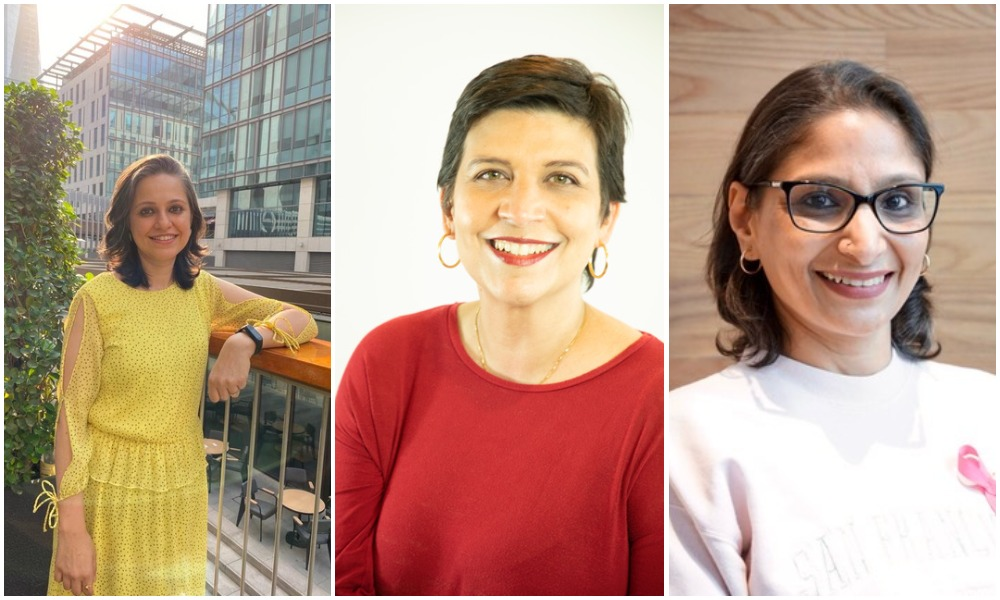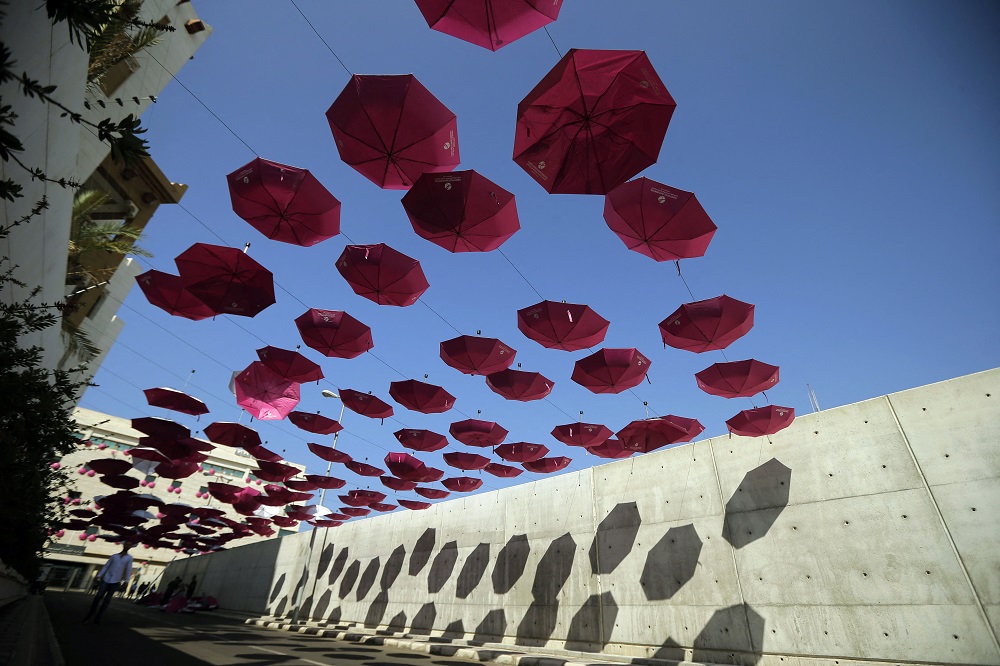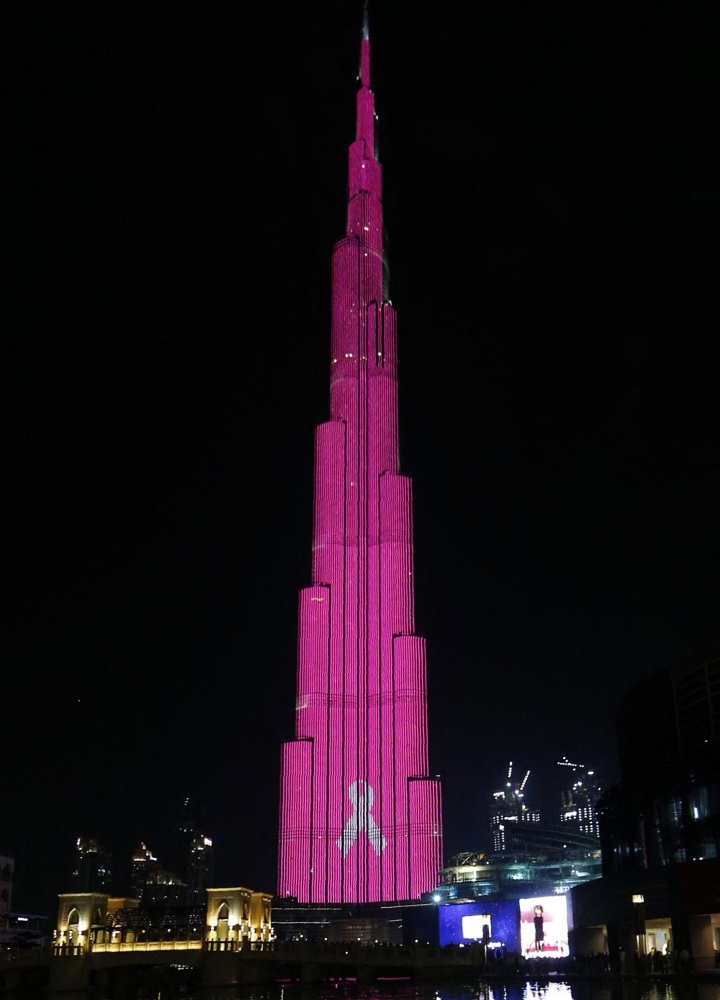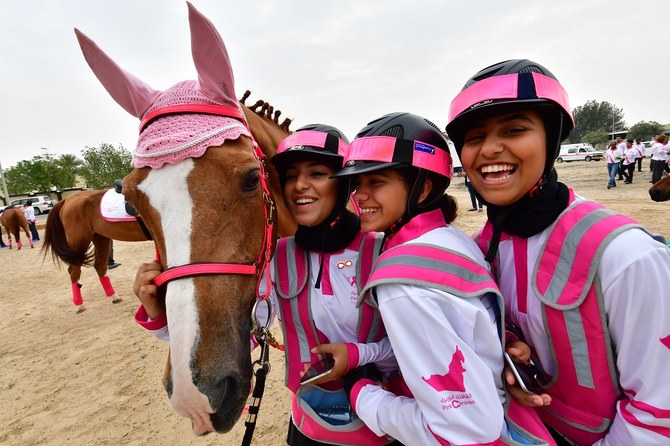DUBAI: Gloria Halim, Cristina Polo, Sapna Venugopal and Bharti Rao come from very different backgrounds but they have one thing in common: they are all breast-cancer survivors who emerged from their battles with the disease with a new outlook on life and a desire to help others.
The four women, who are in their 40s and 50s, are among the millions of women worldwide each year who are diagnosed with some form of breast cancer and embark on a difficult journey of surgeries, chemotherapy and radiotherapy to overcome what can be a fatal illness.
Beyond the physical side effects of the treatments, the experience of fighting and beating cancer can have a profound emotional effect on women. Indeed, medical practitioners say the vast majority of patients emerge from treatment with a greater willingness to extend a helping hand to others.
Many also take what is often seen as a second chance as a sign to change the direction of their lives, taking on new challenges or switching to a new career path.
British citizen Gloria Halim, for example, was working in the information technology sector in the UK when she discovered she had breast cancer 14 years ago. Now in her mid-40s, she is a chief wellness officer in the corporate world and a certified holistic health practitioner living in Dubai.

Breast cancer, known to be the most common cancer in women worldwide, is the leading cause of death among Saudi women, according to a retrospective epidemiological study conducted in 2012. (Shutterstock)
“For me, the key information is that prevention is possible and is important,” Halim told Arab News this month, which is Breast Cancer Awareness Month. “Having gone through what I’ve been through, there is no way I want anybody else to go through it.”
Halim said she has come to appreciate the importance of good physical, emotional and mental health in helping to reduce stress and maintain a strong immune system.
“We are not built to be in fight-or-flight mode constantly,” she said. “It takes a long time to get to the point where the human body says: ‘I’ve had enough. I can’t move.’ The immune system goes down, inflammation of the bodily organs goes up, an environment for disease grows.”
Breast cancer is the most common form of cancer in the world. As of December last year, 7.8 million surviving women had been diagnosed with breast cancer in the past five years, according to the World Health Organization. In 2020, about 2.3 million women were diagnosed with breast cancer worldwide and 685,000 died from the disease.
In Saudi Arabia, of the 24,485 cases of cancer recorded in 2018, 14.8 percent involved breast cancer, making it the most common form of cancer in the Kingdom. Of the 4,707 cancer cases recorded in the UAE in the same year, 22.4 percent were breast cancer.

L-R: Bharti Rao, Cristina Polo and Sapna Venugopal who all beat breast cancer. (Supplied)
While there was little improvement in breast cancer mortality figures between the 1930s and 1970s, survival rates began to rise in several countries from the 1980s on, thanks to early detection programs and new and improved treatments.
A growing body of research and significant medical advances continue to improve the prognosis for millions of women with the disease. But perhaps the most important development has been the increase in public awareness and the willingness of women to check themselves regularly and seek help early if they notice a potential problem.
Cristina Polo, from France, was 43 and living in Dubai when she noticed a lump in her breast in 2018. Determined to see her daughter, who was six at the time and the youngest of three siblings, grow up and have children of her own, she sought treatment immediately.
“Since cancer treatment, I have had a thirst for life,” she told Arab News. “I have this urge to do things in life that I kept postponing or put aside, saying I would do them later.”
Like Halim, Polo viewed her victory over cancer as an opportunity to change course. After completing her treatment, she resigned from a senior position in Dubai’s hospitality industry, began a course in digital marketing, earned a certificate in teaching English as a foreign language, and established a blog, called Cancer Majlis, devoted to cancer awareness.
INNUMBERS
* 2.3m women diagnosed with breast cancer worldwide in 2020.
* 685,000 breast cancer deaths globally in 2020.
(Source: WHO)
She said she spent many years before she was confronted with cancer worrying about “what ifs” and putting off making changes.
“Then, boom, the diagnosis came,” Polo said. “Suddenly, all this ‘what if, what if, what if’ became ‘what else, what else, what else can I explore?’”
Polo moved to Paris last year, where she teaches English at a French hospitality school and is a consultant for the travel and hospitality industry. She also enjoys sculpting and painting in her spare time and does voluntary work with recovering cancer patients, helping them to plan their post-cancer lives by developing new skills in the arts.
Sapna Venugopal had a similar desire to help others following her cancer diagnosis in Sept. 2017 at the age of 46 while living in Dubai. So she began volunteering to visit patients undergoing chemotherapy in the city, and donating a portion of her income as a jewelry designer and from furniture restoration to a cancer charity in her native India.
Despite the many awareness campaigns launched by governments and charities the world over, women are still often left in shock when they receive a breast cancer diagnosis.

Pink umbrellas decorate the Lebanese Ministry of Public Health in the capital Beirut as part of a national campaign for the public awareness of breast cancer. (AFP/File Photo)
“At the very beginning everybody thinks they have just been handed a death sentence, which they haven’t,” Elsbeth Bentley, a nurse at Dubai’s Mediclinic City Hospital, told Arab News. She is one of the few specialist breast cancer nurses in the UAE, who undergo an extra year of training to teach them how to help with the specific needs of breast cancer patients, with a main focus on communication skills.
“Research shows that after the word ‘cancer’ has been mentioned in a meeting with a doctor, most people will only retain some 20 percent of what they are told, because it freezes the brain and there is this feeling that it is happening to somebody else and they are not connected with it,” Bentley added.
Regardless of background and social status, all women react to the diagnosis in a similar way, said Bissi Punnackel-Sivaraman, a breast care nurse at King’s College Hospital in Dubai.
“It is a stressful period,” she told Arab News. “Most of the time patients will be in shock upon diagnosis, followed by anger, anxiety, fear and loneliness. Some of the patients will be in denial and it will take some time for them to accept the diagnosis, as it happens unexpectedly.
“Initial reaction will be more or less the same. But taking it in and coping with the treatment can be slightly different, as each individual is unique and it can depend on their personal, family and occupational backgrounds.”
Bharti Rao, from India, recalled feeling “absolutely numb” and slipping into a state of denial when cancer was diagnosed in 2018, the year she turned 40, while living in Dubai.

Dubai's Burj Khalifa is lit up in pink to raise awareness and funds to fight breast cancer. (AFP/File Photo)
“But I didn’t sit on it for long because I understood that the more I go into denial, the more I am being pushed toward darkness,” she told Arab News.
Rao said she drew much of her resolve to seek treatment and beat the disease from her husband, parents, daughters and in-laws.
“I fought physically but they fought with me mentally and physiologically,” she said. “And that is where my battle was won. My day started with a smile and ended with gratitude.”
Rao worked in the banking sector but left her job before the cancer diagnosis and had worked as a volunteer helping children with autism. After beating the disease she developed a new outlook on life and is now a certified holistic lifestyle coach who provides her services for free to friends and relatives in Dubai and other people they refer to her, helping them during their emotional journeys while fighting cancer.
There is clearly an overriding sense among many breast-cancer survivors that they have been given a second chance in life to take on fresh challenges and pursue experiences they had long put on hold. Many also emerge with a sense of gratitude and a desire to give something back in some way.
“They want to see some good come out of it,” said nurse Bentley. “Life is not going to go back to exactly how it was. Something in them has changed and that means they don’t want to accept the things they accepted before.”















